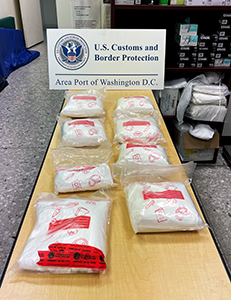
Nearly 34 pounds of dangerous ketamine hydrochloride, an animal tranquilizer abused by users, may have arrived in an airline’s rushed baggage, but U.S. Customs and Border Protection officers at Washington Dulles International Airport made sure it went nowhere fast.
CBP agriculture specialists initially detected anomalies when they x-rayed the rushed suitcase on August 8 after the suitcase arrived from Amsterdam. They immediately alerted CBP officers. The anomalies consisted of eight pouches of a white crystalline substance. CBP officers tested the substance with a handheld elemental isotope analysis tool and identified the substance as ketamine hydrochloride.
The ketamine hydrochloride weighed 15.3091 kilograms or 33 pounds and 12 ounces, and it had a street value of about $900,000.
Since the ketamine was discovered in a rushed baggage, the traveler connected to the suitcase was not on site.
 An investigation continues.
An investigation continues.
Ketamine hydrochloride is a Schedule III non-narcotic compound regulated under the Controlled Substances Act.
According to the DEA, ketamine, commonly known on the street as Special K, is used in both human and veterinary medicine to induce sedation, immobility, and relief from pain. It has recently been used by medical professionals for mental health and substance use disorders. Ketamine is abused for its ability to induce dissociative sensations and hallucinations. Ketamine has been used to facilitate sexual assault. Overdoses can lead to nausea, irregular heart rate, muscle stiffening, unconsciousness, and respiratory failure leading to death.
“Transnational criminal organizations continue to smuggle their dangerous drugs into the United States, but Customs and Border Protection officers and agriculture specialists work very hard every day to intercept these illicit shipments,” said Marc Calixte, Area Port Director for CBP’s Area Port of Washington, D.C. “Our narcotics interdiction efforts are one way in which CBP helps to keep our communities safe from the scourge of dangerous drugs.”


